#Will Arbery
Explore tagged Tumblr posts
Text
finished reading heroes of the fourth turning (one of the plays danya directed) and it was also very good
#an insightful peek into the mind of conservative catholic intellectuals#personal#heroes of the fourth turning#will arbery#danya taymor
6 notes
·
View notes
Text

Heroes of the Fourth Turning
By Will Arbery.
3 notes
·
View notes
Text

Succession
Season 4, “Living+”
Director: Lorene Scafaria
DoP: Katelin Arizmendi
#Succession#Living+#Succession S04E06#Season 4#Lorene Scafaria#Katelin Arizmendi#Jeremy Strong#Kendall Roy#Georgia Pritchett#Will Arbery#Jesse Armstrong#HBO#HBO Entertainment#Gary Sanchez Productions#Hyperobject Industries#Hot Seat Productions#Project Zeus#TV Moments#TV Series#TV Show#television#TV#TV Frames#cinematography#April 30#2023
12 notes
·
View notes
Text
Books for political formation
Books that have left an indelible mark on my understanding of politics some way. My political development is unfinished, so this list is unfinished - I'm always open to suggestions
Capital Vol. 1, Karl Marx - unmasks the inherently exploitative social relations embedded within capitalism, critiques capitalism as ineffective/self-destructive (not just immoral)
Capital and Ideology, Thomas Piketty - there is no such thing as a "natural" social order, examines how inequality regimes have emerged and been justified across the world throughout the past 1000 years of history
Nixon Agonistes, Garry Wills - captures a cross-section of American politics over a short period, probing insights into the psychology driving political affinities, documents the evolution of the word "liberal" in American political discourse
What Are We Doing Here?, Marilynne Robinson - provides a constructive, anti-Hobbesian view of society
Poverty, by America, Matthew Desmond - shows the extent to which poverty in America is a policy choice, harm reduction is possible without revolution
The Code of Capital, Katharina Pistor - a cursory overview of the legal strategies to insulate capital from any competing legal claims
Eichmann in Jerusalem, Hannah Arendt - laziness and insistence on self-exoneration is often the psychological engine behind human wickedness and injustice over and above malice
Illness as Metaphor / AIDS and Its Metaphors, Susan Sontag - shows how deeply ingrained prejudicial views of disability is within our collective language and psyche
Blood Meridian, or, the Evening Redness in the West, Cormac McCarthy - violence has never been excised from politics, the invisibility of violence to the bourgeois is an illusion
Lysistrata, Aristophanes - unmasks the nature of gender politics despite its operation behind closed doors, imagines a project of mass organizing along gender lines
Civilization and Its Discontents, Sigmund Freud - civility is unfortunately a tenuous prospect
Heroes of the Fourth Turning, Will Arbery - excoriates conservative psychological pathologies
Martin Luther King Jr
A Gift of Love - justice is love in public
Letter From a Birmingham Jail - there are contexts where civil disobedience is mandatory for the Christian, solidarity with the marginalized is always mandatory
The Waste Land, T.S. Eliot - progress is not inevitable
William Faulkner
Absalom, Absalom! - racism is an inexorable part of American capitalism, imperialism cannot be stopped until we are able to free ourselves of our disingenuous national myths
The Sound and the Fury - nostalgia makes you an idiot, unable to understand your present or to predict your future
Herman Melville
Billy Budd, Sailor - history is unavoidably malleable
Moby-Dick - a true-believer demagogue is worse than a cynically disingenuous one, democracy can be an ineffective antidote to a tyrant
Franz Kafka
The Trial - the very procedures instilled to protect (or at least mitigate) injustice can also exacerbate it
The Metamorphosis - modernity interferes with our ability to see and relate to others as human, liberalism's self-advocating and individualistic ethic destroys us from the inside out because it forecloses our ability to recognize this
John Milton
Areopagitica - freedom of speech is as much about the individual's freedom to render judgment on speech as it is about the speakers ability to speak, the problem with censorship is the top-down nature of it, not in the governed people's discernment of quality or value
Paradise Lost - similar to Birmingham Jail, the character of Abdiel represents righteous opposition to Earthly principalities
The Autobiography of Malcolm X - the psychological, spiritual, emotional toll that being black in America takes on a person, black empowerment is a necessary step towards black liberation
Ursula LeGuin
The Lathe of Heaven - structural reform can only be undertaken democratically, no change is without trade-offs so changes must be broadly accepted and supported by the populace who will inevitably bear the unforeseen burden that results
The Ones Who Walk Away From the Omelas - shows the extent to which our brains are broken by imperialistic thinking, exploitation is a necessary feature of the worlds we are capable of imagining
#karl marx#thomas piketty#garry wills#marilynne robinson#matthew desmond#katharina pistor#hannah arendt#susan sontag#cormac mccarthy#aristophanes#will arbery#martin luther king jr#t.s. eliot#william faulkner#herman melville#virginia woolf#franz kafka#john milton#malcolm x#ursula k. le guin
6 notes
·
View notes
Text
Rogue Machine Theatre's production of Heroes of the Fourth Turning:
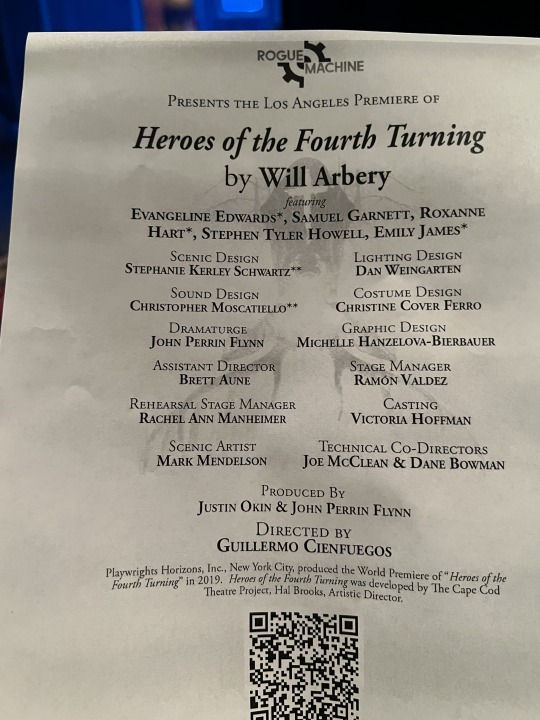
Last week I saw a preview performance of Heroes of the Fourth Turning. During the pandemic I had seen a Zoom performance of this play and it worked remarkably well, so I was excited to see it in person for the first time. The director briefly introduced the show and cautioned that as it was a preview some aspects of the performance were still being refined, so without getting too detailed here, I did really enjoy it. It was just as well-written as I remembered, and the two hours (no intermission) went by very quickly. I belatedly realized that I had seen Emily James (who played Emily) before as Antigone in A Noise Within's production of Jean Anouilh's Antigone eight years ago, so it was a bit of a fun surprise to see an actor I've seen before in a new role.
#heroes of the fourth turning#will arbery#rogue machine theatre#that antigone production was one of the rare times I have thought “WTF was that” after a seeing a show#maybe I will post more thoughts about this play later but I am too tired
2 notes
·
View notes
Text

Jesse Armstrong et al: Succession: Season 4: The Complete Scripts (2023)
#jesse armstrong#succession#tv#hbo max#faber and faber#tony roche#georgia pritchett#ted cohen#jon brown#lucy prebble#will tracy#will arbery#susan soon he stanton#legacy media#capitalism
1 note
·
View note
Text
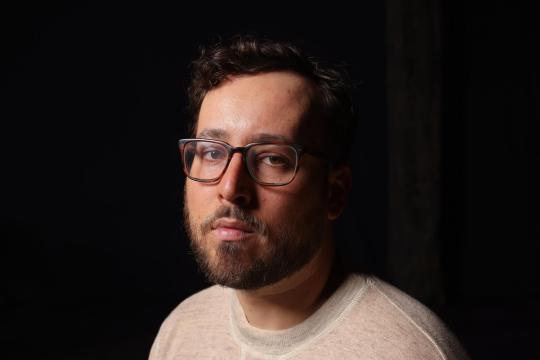
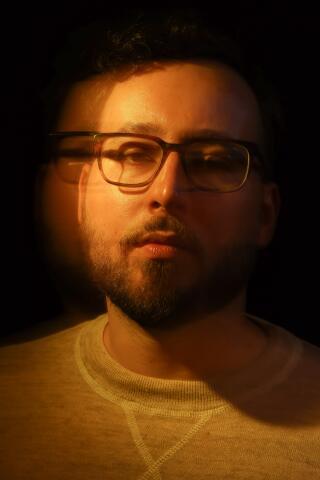
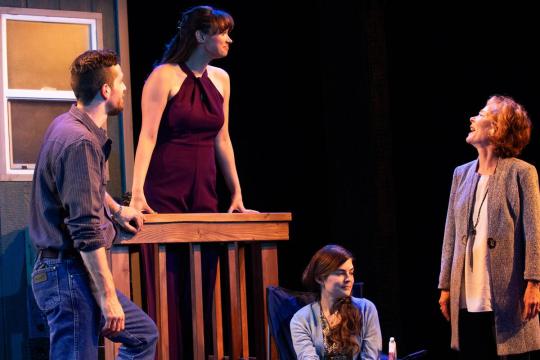
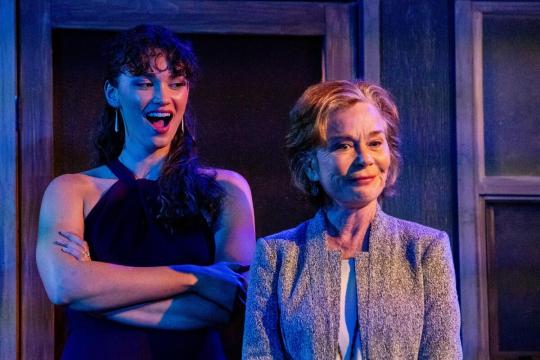
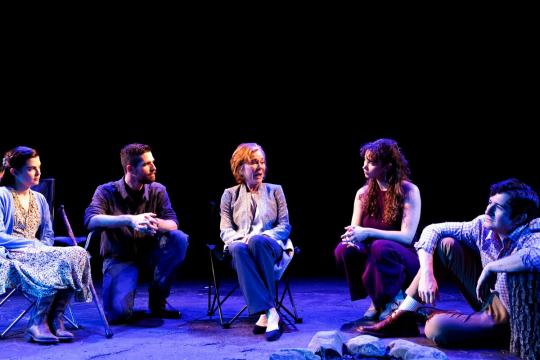
I saw this play in previews and HIGHLY recommend catching it if you can. Religious conservatives have a drinking party....Finally, a bit of press about "Heroes of the Fourth Turning" from the Los Angeles Times. Not a review yet, just a profile of the playwright, Will Arbery.
(Times) Did this Will Arbery play about young religious conservatives predict Jan. 6? By Charles McNulty, Theater Critic Aug. 22, 2023
“Heroes of the Fourth Turning,” Will Arbery’s critically heralded drama that was a Pulitzer Prize finalist in 2020, does something rare in the American theater. It turns the stage over to young religious conservatives, whose ideologies and articles of faith are presented without apology or indictment.
When the work premiered at Playwrights Horizons in 2019, audiences and critics seemed grateful for the opportunity to eavesdrop on the reunion of four friends who have gathered to celebrate the inauguration of a new president of Transfiguration College, a conservative Catholic institution in Wyoming that has shaped who they are today. In the still early days of Donald Trump’s divisive presidency, when party lines are hardening and public dialogue is coarsening, these late-night stragglers hash out around a fire pit their shifting political and religious priorities.
So much of conservative discourse these days seems bent on “owning the libs.” “Heroes” invites liberal theatergoers to listen to the other side reflect on the polarized historical moment when supposedly out of the enemy‘s earshot. The characters hardly form a monolith. They vary in disposition as well as ideological conviction, but all would be considered hardliners. Arbery denies progressive audiences a surrogate and then compounds that challenge by asking them to witness the vexing complexity of the characters as they bare their troubled souls.
Re-encountering the play at the Matrix Theatre, where Rogue Machine is presenting the Southern California premiere, I am struck by how prophetic it seems. Set in Western Wyoming on Aug. 19, 2017, one week after the Charlottesville riot and two days before the solar eclipse that became known as “the Great American Eclipse,” “Heroes” predates the Jan. 6 insurrection and the Supreme Court’s overturning of Roe vs. Wade yet now seems to anticipate both of these watershed events.
Sitting in a studio upstairs at the Matrix Theatre when rehearsals were still underway, Arbery said that the decision to situate the play at a precise point in time freed him from making revisions that might be seen as a “a bid for relevance.” His mission was to focus on the “human and spiritual journey” of his characters while being as accurate as he could to the terms of their debate.
“When the play was first going up and we were doing auditions in the spring of 2019, I hadn’t actually locked down a specific time for when the play was taking place yet,” he said. “I was going back and forth, wondering if I should change things based on current events, because so much history was happening so rapidly every day. And then I remembered that solar eclipse that was in August 2017, right after the Charlottesville riot. And it just felt like this moment when the whole country was looking at the same beautiful, terrifying thing.”
One topic the characters keep returning to is the imminent battle between the secular left and the religious right for the soul of Western civilization. The militancy of this rhetoric might seem to foreshadow the violent eruption of Jan. 6, but Arbery denies he had this in sights.
“The reason that I have all that language in my play about the coming war is because this was an issue that Steve Bannon talked about a lot and people on the right were obsessed with,” he said. “I remember looking at Jan. 6 news footage and being like, ‘Is this what they were talking about?’ But there’s no way in which I felt like I was writing this play in order to predict events. I was mostly just reflecting back what I was hearing.”
Austere in form, “Heroes,” steeps us in the heated conversation of its characters as they reveal how they’ve changed since leaving the security of Transfiguration. The positions they espouse (anti-choice, anti-LGBTQ+, anti-anti-racism) will be alienating for theatergoers accustomed to seeing their values mirrored back to them. But Arbery makes it difficult to dismiss their humanity even when they seem to be dismissing our own.
This is a difficult play yet a necessary one in an America that is either unwilling or incapable of binding its own fractures. If we can’t listen to one another, we certainly won’t be able to reach anyone. “Heroes” starts from this premise.
Rogue Machine’s production, astutely directed by Guillermo Cienfuegos, grounds the play in an enriching character-based realism. At Playwrights Horizons, “Heroes” (directed by Danya Taymor) seemed as enticingly abstract as a musical work, a symphony of provocative arias building to a desperate Rachmaninoff climax. At the Matrix, the excellent cast inhabits the silences of the play as adeptly as they slip into the boisterous arguments. The multifaceted nature of the drama requires more than one encounter to appreciate.
Theater critic turned TV producer (“Veep,” “Succession”) Frank Rich saw “Heroes” in New York and recommended the play to Jesse Armstrong, the creator of “Succession.” Armstrong liked what he saw and offered Arbery a consulting role on the HBO series.
“There’s some political stuff in Season 3 that I helped with, along with giving some notes on scripts,” Arbery said. “And then [Armstrong] asked me back for Season 4 as a full writer, which was great because the last thing that I wanted was to be seen as some sort of conservative whisperer. I feel I have more to write in that space, but to be asked on as a full writer and to write an episode that doesn’t have anything to do with politics was such an honor.”
The irony of “Heroes” launching Arbery’s profile is that he said the play isn’t characteristic of his work. He described his style as “unconventional,” even a little “weird,” and called “Plano,” the “freewheeling and surreal” play that came out a year before “Heroes,” his favorite of his works.
Arbery was raised in Texas in a conservative Catholic home. His parents are academics who now teach at a conservative Catholic college not unlike Transfiguration. He has seven sisters, no brothers. Arbery broke tradition by not attending a Catholic university. Instead, he went to Kenyon College and then received an M.F.A. in writing for the stage and screen from Northwestern University.
After grad school, he returned to New York, where he lived after Kenyon, and settled in Brooklyn. Inspired by such playwrights as Young Jean Lee, Richard Maxwell and Erin Courtney, he became part of the downtown theater scene. He named Maria Irene Fornés and Caryl Churchill as crucial influences and expressed an early affinity for Tom Stoppard that is clearly evident in his proclivity for cascading monologues.
“Heroes” had me imagining what a modern-day hybrid of Anton Chekhov and George Bernard Shaw might be like in a dramatic package that observes the same unity of time and place as “Who’s Afraid of Virginia Woolf?” Arbery said that while he loves Chekhov, he wasn’t aware of the metaphoric connection between the mysterious sound of a string breaking in “The Cherry Orchard” and the frightening noise that interrupts the backyard gathering in “Heroes” until someone asked him about it in New York.
The success of the play has catapulted him into a different life. He relocated with his girlfriend to Los Angeles and has screenwriting projects on deck. Inspiration has been riding high. He had two new plays produced in New York last year: “Corsicana” at Playwrights Horizons and “Evanston Salt Costs Climbing” in a New Group production at Pershing Square Signature Center. And he’s working on a libretto for an opera for The Met, an adaptation of Dostoevsky’s “Demons” with composer Matthew Aucoin.
As the WGA strike stretches on and the American theater spirals from one crisis to another, Arbery has been developing a new screenplay he hopes to direct himself. But as fortune would have it, just as he was settling into his new home in Mt. Washington, Rogue Machine announced that they were doing his play.
Arbery is grateful to have been brought into the fold of one of the city’s most adventurous small theater companies. He didn’t want to speculate on why the larger theaters in the area weren’t vying to produce perhaps the most talked about drama since Jeremy O. Harris’ “Slave Play.” (Artistic timidity, I suggested.)
Harris, a friend and champion of Arbery’s, was behind an online presentation of “Heroes,” and it’s easy to see what impelled him to take a producing interest. “Heroes” excavates a stratum of white America with the same incisive probing that “Slave Play” brought to its investigation of our country’s interracial foundation.
“I remember Jeremy calling and telling me about ‘Slave Play’ and me telling him about ‘Heroes,’ so maybe there was a sort of energetic transfer between the two of us when we were writing these plays,” Arbery said. “Jeremy makes me feel braver. He always zeroes in on the bravest thing that my work is doing and pushes me a little bit further in that direction.”
Arbery was reluctant to talk about his own political and religious beliefs for the simple reason that he’d prefer an audience to see the play without preconceived notions about the author. It’s safe to say that he has trailed away from his strict conservative upbringing, but he was happy to report that “Heroes” has brought him closer to his family, where ideas of the kind debated in the play were rigorously dissected at the dinner table.
“In terms of my relationship with my parents, the play just allowed us to talk more openly about things, he said. “I think it was surprising and also satisfying to them to realize that I’ve been listening so closely and that I was invested in trying to get it right even if there were some artistic choices that maybe they didn’t agree with.”
Like one of the characters in “Heroes,” Arbery couldn’t resist baring his own soul: “Because I chose not to go to a classical Catholic school as all my sisters did, I was the one who got out. I think for a long time they were worried that I was floating aimlessly in the world. And then I circled back around with this play and they saw that I was really doing something out there.”
Digging into his own life has yielded creative dividends. “Writing with more honesty and specificity and courage about where it was that I came from, and just sort of owning that and not being ashamed of it, led me on a whole new path as an artist,” he said. “Rather than trying to be cool, clever or experimental, I just wanted to write truthfully. It became the only thing I was interested in, even though it was scary.”
Arbery said both “Plano” and “Heroes” were born out of this new commitment. His recent play “Corsicana,” perhaps his most daringly personal work, was inspired by his older sister Julia, who has Down syndrome.
“Now, it’s like I’ve created a new standard for myself,” he said. “Even if I’m not writing about my family, I want to feel like there’s something terrifying and impossible at the center of it. Otherwise, it’s not worth doing.”
'Heroes of the Fourth Turning' Where: Rogue Machine at the Matrix Theatre, 7657 Melrose Ave, L.A. When: 8 p.m. Fridays, Saturdays, Mondays, 3 p.m. Sundays. (Check for exceptions.) Ends Oct. 2 Tickets: $45 Contact: 855-585-5185 or www.roguemachinetheatre.org Running time: 2 hours, 5 minutes, with no intermission
Photo Credits: Playwright Will Arbery, whose play “Heroes of the Fourth Turning,” a Pulitzer Prize finalist, is having its Southern California premiere courtesy of Rogue Machine Theatre at the Matrix. (Dania Maxwell / Los Angeles Times)
A headshot of a man wearing glasses. Playwright Will Arbery, whose play “Heroes of the Fourth Turning,” a Pulitzer Prize finalist, is having its Southern California premiere courtesy of Rogue Machine Theatre at the Matrix. (Dania Maxwell / Los Angeles Times)
Rogue Machine's production of "Heroes of the Fourth Turning" Rogue Machine’s production of “Heroes of the Fourth Turning” — Stephen Tyler Howell, Evangeline Edwards, Emily James, Roxanne Hart. (John Perrin Flynn)
Rogue Machine's production of "Heroes of the Fourth Turning" Rogue Machine’s production of “Heroes of the Fourth Turning” — Emily James, Samuel Garnett, Stephen Tyler Howell. (John Perrin Flynn)
Rogue Machine's production of "Heroes of the Fourth Turning" Rogue Machine’s production of “Heroes of the Fourth Turning” — Evangeline Edwards and Roxanne Hart. (John Perrin Flynn
Rogue Machine's production of "Heroes of the Fourth Turning" Rogue Machine’s production of “Heroes of the Fourth Turning” — Emily James, Stephen Tyler Howell, Roxanne Hart, Evangeline Edwards, Samuel Garnett. (John Perrin Flynn)
#refrigeratormagnet
#refrigerator magnet#will arbery#playwright#rogue machine#matrix theater#los angeles#intimate theater#drama#stage#play#writers#religious conservatives
1 note
·
View note
Text
He wasted no time with that beard 😑

96 notes
·
View notes
Note
He did it again https://www.instagram.com/reel/C_-2d94vs9F/?igsh=MTJsc2t6NWNrbG16eQ==
He just can't be stopped
145 notes
·
View notes
Photo
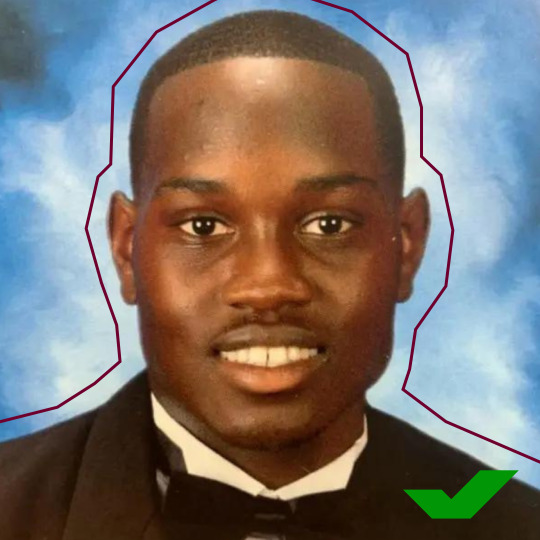

Four years ago today, Ahmaud Arbery was chased and killed by three white men while jogging in a Georgia residential neighborhood.
Ahmaud’s killers were convicted of murder and federal hate crimes one year later after Georgia passed a hate crime bill with bipartisan support.
While this legislation was a step in the right direction, true justice would be Ahmaud still living today. His life mattered.
355 notes
·
View notes
Text
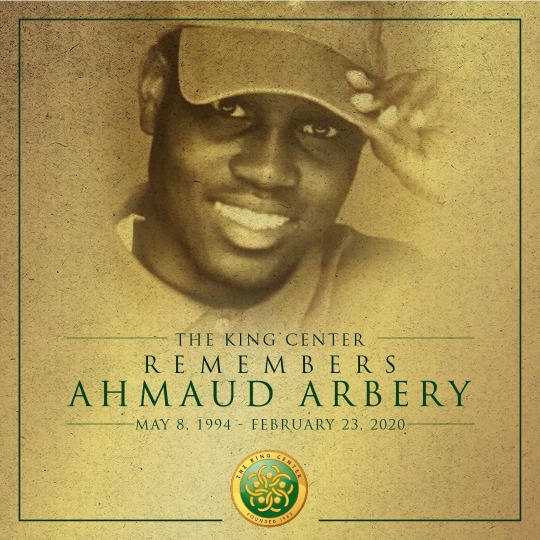
The King Center remembers #AhmaudArbery on his 29th birthday. He should be celebrating - alive and thriving. Our hearts go out to Ahmaud's family, including his parents, Wanda Cooper-Jones and Marcus Arbery Sr.
87 notes
·
View notes
Text
My name is James.
I am a white man. I can do, say, and be all of these things without fear because of my #whiteprivilege and I will not be silent about the injustice that has existed forever but is now just reaching your TVs or newsfeeds. This is not a new concept and it’s despicable and it needs to stop! I stand with my black brothers and sisters.
I will not be killed.
I can go jogging (#AmaudArbery).
I can relax in the comfort of my own home (#BothamJean and #AtatianaJefferson).
I can ask for help after being in a car crash (#JonathanFerrell and #RenishaMcBride).
I can have a cellphone (#StephonClark).
I can leave a party to get to safety (#JordanEdwards).
I can play loud music (#JordanDavis).
I can sell CD's (#AltonSterling).
I can sleep (#AiyanaJones)
I can walk from the corner store (#MikeBrown).
I can play cops and robbers (#TamirRice).
I can go to church (#Charleston9).
I can walk home with Skittles (#TrayvonMartin).
I can hold a hair brush while leaving my own bachelor party (#SeanBell).
I can party on New Years (#OscarGrant).
I can get a normal traffic ticket (#SandraBland).
I can lawfully carry a weapon (#PhilandoCastile).
I can break down on a public road with car problems (#CoreyJones).
I can shop at Walmart (#JohnCrawford) .
I can have a disabled vehicle (#TerrenceCrutcher).
I can read a book in my own car (#KeithScott).
I can be a 10yr old walking with our grandfather (#CliffordGlover).
I can decorate for a party (#ClaudeReese).
I can ask a cop a question (#RandyEvans).
I can cash a check in peace (#YvonneSmallwood).
I can take out my wallet (#AmadouDiallo).
I can run (#WalterScott).
I can breathe (#EricGarner).
I can live (#FreddieGray).
This is reality.
ENOUGH IS ENOUGH!
#Amaud Arbery#Botham Jean#Ataiana Jefferson#Johnathan Ferrell#Renisha McBride#Stephon Clark#Jordan Edwards#jordan davis#Alton Sterling#Aiyana Jones#mike brown#Tamir Rice#Charleston 9#Trayvon Martin#sean bell#Oscar grant#Sandra bland#philando castile#corey jones#john crawford#terrence crutcher#keith scott#clifford glover#Claude reese#randy evans#yvonne smallwood#amadou diallo#walter scott#eric garner#freddie gray
8 notes
·
View notes
Note
What do you think of the song 'Try That in a Small Town' by Jason Aldean?
Jason Aldean's song says if you try those "big city" things out here in small towns, there's gonna be swift justice delivered by the local populace. He means this as a good thing and at first the song sounds like it's about being anti-crime, but soon it moves to vigilante justice, which is a terrifying prospect for minority populations.
Yesterday a national monument to Emmett Till was dedicated. Fourteen-year-old Emmett was abducted, beaten, and lynched after he was accused of whistling at a white woman in small town Mississippi.
Emmett Till is far from the only one who met a violent death at the hands of small-town justice: Matthew Shepherd, Brandon Teena, Medgar Evers, James Byrd, Ahmaud Arbery, and the list goes on
————————————————————-
Small towns have a strong sense of community and togetherness, you can also find this in big cities. Big cities have people of color, allies, and queer folks, and so do small towns. Illegal drugs, domestic violence, and people being harassed and attacked for being "different" happens in both the big city and the small town. Good people live in small towns and in the big city. Urban and rural areas are in a symbiotic relationship, we need each other.
I view this song as yet one more way of saying we're a divided nation and need to view each other with suspicion. I believe we can celebrate the good people where we live without running down folks from other places. We don't have to view people who live in places different from us as enemies who have to be treated harshly.
27 notes
·
View notes
Text

Brief thoughts on Evanston Salt Costs Climbing, presented by Rogue Machine Theatre:
Not too long, no intermission
Story has four main characters: two longtime road salt truck drivers in Evanston, IL, their manager in the local public works department, and the manager’s adult daughter
All of them are living with significant anxieties related to family, relationships, and the world and are dealing with those with varying levels of success
Well-acted- I believed each character from the very start
Managed to be very compelling even when it was just two characters repeating "fuck you" back and forth to each other
I wondered if any of these characters had health insurance that covered mental health treatment because they all seemed to be very aware and often vocal about their problems but lacking many methods to address them.
Not unlike Arbery’s Heroes of the Fourth Turning in that it’s heavy on dialogue with elements of the uncanny, though fewer big ideas and great ambitions and more concrete daily difficulties. That play felt like people who expected to live in the extraordinary dealing with the limits of real life. This one feels like people who expect to be ordinary and have routines to maintain that ordinariness trying to find stability when larger forces touch their lives.
0 notes

